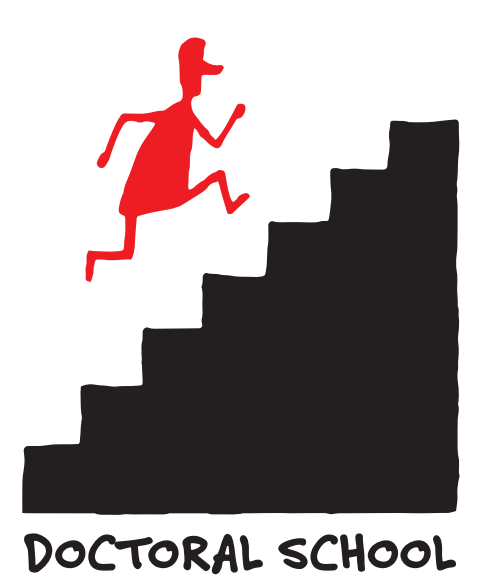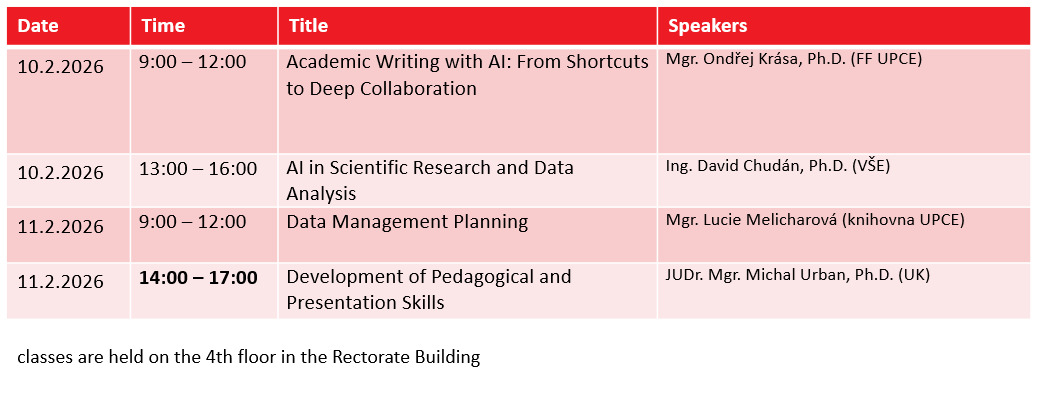The University Doctoral School provides centralised education for doctoral students through a series of teaching sessions on various topics. These sessions introduce and present examples of good practices in research ethics, text production, citations, academic writing, and more.
The aim of the University Doctoral School is to enhance the skills of early career researchers in specific areas of science and research. These skills and competencies are essential for the personal and professional development of early career researchers and are valuable across different sectors.
The teaching sessions are led by active, experienced scientists and subject matter experts.
You can participate and earn a certificate!

University Doctoral School at the University of Pardubice
The 3rd year of the University Doctoral School will take place in two terms – in the winter semester from October 13 to 15, 2025, and in the summer semester in February 2026. The program is divided into thematic blocks that focus on key competencies and current challenges in science, research, and academic work.
For organizational reasons, the February part of the University Doctoral School will take place on only two days, February 10 and 11, 2026 and the entire program will be conducted in English. Students will receive a certificate of completion of the University Doctoral School after attending at least 5 of the 8 specialized blocks offered. The certificate will be issued after the February program.
The University Doctoral School is a unique opportunity for our PhD students who wish to familiarise themselves with modern trends in scientific and academic activities and gain a competitive edge at the start of their scientific careers.
Academic Writing with AI: From Shortcuts to Deep Collaboration
AI can be a shortcut that undermines serious work – or a powerful collaborator that deepens it. This workshop explores the latter path. We begin with tools for systematic engagement with literature, including audio and video synthesis, to facilitate efficient review. We then turn to intensive AI collaboration in academic writing itself – AI as research partner, argument critic, peer review simulator, and editor. The goal is not to outsource thinking, but to cultivate a mode of working that sharpens understanding, strengthens argumentation, and produces better scholarship.
Lecturer: Mgr. Ondřej Krása, Ph.D.
AI in Scientific Research and Data Analysis
This lecture provides an overview of current AI models and their capabilities, with particular emphasis on advanced reasoning and deep research functions. It explores practical applications of AI in research and development, including its role as a brainstorming partner, in experimental design, data analysis, assisted academic writing, and in tools for presenting research results. Ethical aspects of using AI in scientific work will also be addressed. The session includes a workshop component featuring a demonstration of synthetic data analysis using a general-purpose chatbot, followed by a demonstration of a specialized AI tool for data analysis (Julius.ai).
Lecturer: Ing. David Chudán, Ph.D.
Data Management Planning
The lecture introduces doctoral students to the field of Research Data Management (RDM) within the context of modern Open Science. Participants will learn why effective data management is crucial not only for transparency and research integrity but also for fulfilling the requirements of research funders (e.g., Horizon Europe, TA CR, or GA CR). The main part of the session will be dedicated to the Data Management Plan (DMP)—its structure, content, and practical significance throughout the lifecycle of a research project. The final part will introduce the Data Stewardship Wizard (DSW), a tool that facilitates DMP creation at the University of Pardubice, and will guide students through its basic setup and core features.
Lecturer: Mgr. Lucie Melicharová
Development of Pedagogical and Presentation Skills
Do you have a class coming up and would you like to prepare as well as possible? Wondering how to use evidence-informed approaches in education and examples of good practice? Or have you already started teaching and would like to improve your teaching? Do you want to learn how to transfer your expertise and skills to your students in the most effective way? How to boost your confidence as a teacher? How to motivate your students? What is really important in your work of university teacher? If you answer yes to at least one of these questions, then feel free to attend this session. It aims to offer a basic insight into didactics, regardless of your field of study. We will focus mainly on practically applicable information, methods and activities, and will not lecture about educational theories. You will learn how to better plan, conduct and reflect on your lessons and engage your students more and more effectively - whether you are doing a one-off seminar or a semester-long course. Needless to add that not only you, but also your students will appreciate it.
Lecturer: JUDr. Mgr. Michal Urban, Ph.D.
Invitation
| Files for download | Size |
|---|---|
| Invitation - pdf | 351 kB |



